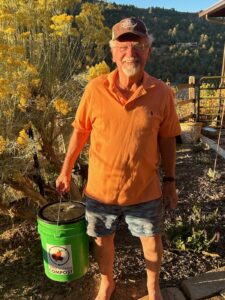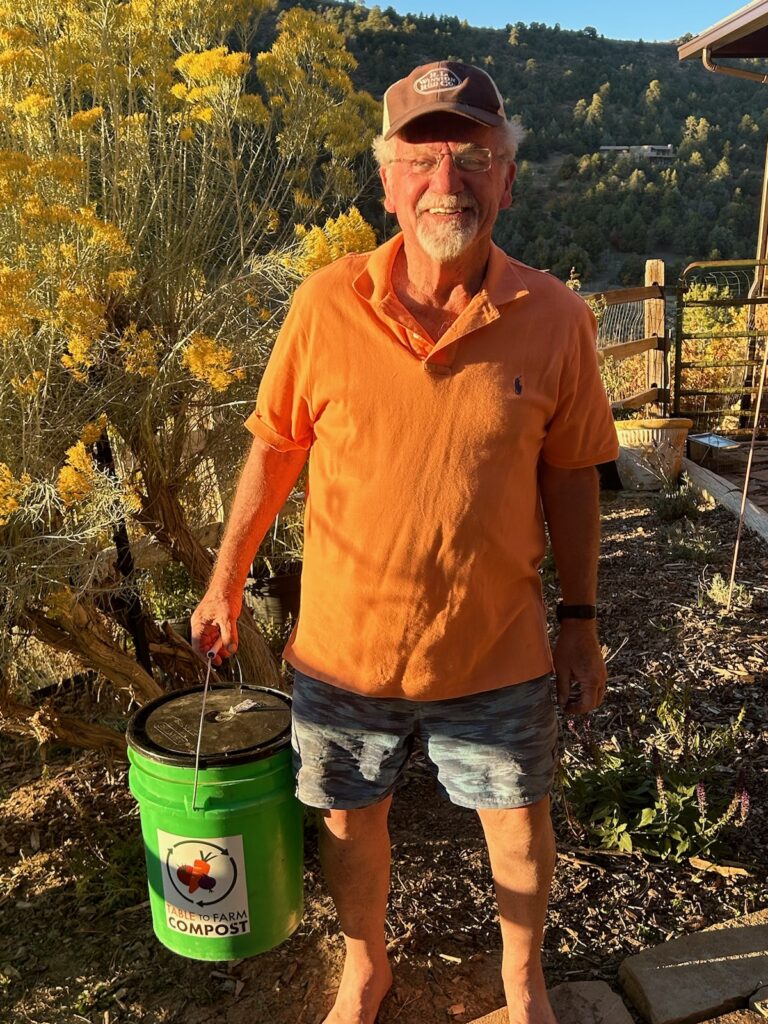One Boomer's Evolution to Generation Perennial
Buzz Bricca hates compost. Composting. Compost piles. All of it. Every last rotty, crumbly bit.
Ask anyone who knew young Buzz (Richard) and that’s what they would have said.
Back then, composting meant work. “There were seven kids in my family and in our family, you worked,” he recalls. “Your weekend, at least one day, was given to working in the yard. We had a big yard. I was always mowing the lawn or digging or stuff like that and I hated it.”
Compost was one more chore Buzz had to do before he could go play. “My friends would say let’s go out and go fishing and I’d say, ‘Well, I gotta work in the yard. Maybe you can come over and help me get it done early?’ My father found enough work to keep my friends busy all day!” Buzz chuckles.
In the Garden of Good and Evil
Buzz also associated composting and gardening with punishment. In high school, he spent most of his time suspended for setting off small explosions. As explanation, Buzz only offers, “I prefer a good dose of anarchy. Anarchy is good for the soul. It makes you more creative.”
Nonetheless, creativity comes with consequences. “When I would get suspended from school,” Buzz frowns, “my father would have a list of things for me to do in the garden. I would wake up in the morning and, while my brothers and sister would go off to school, I’d go to the garden with a shovel and work.”
When Buzz enlisted with the U.S. Army, he kicked off not only the dust of his hometown, but also the dust of the family garden and compost piles. Never again, for as long as he lived, would he touch a trowel or plant a seed. Pull a weed? Not on your life!
Only after his four years’ service did Buzz realize how special gardening was to him. He says, “At the time, you know, I kinda hated it but I felt, in a way, more at home in the garden than I did at school.”
As soon as he arrived home, Buzz grabbed the old shovel and went out to the garden. He beefed up its rows, increased its harvest yield, and expanded new plots. “That was my turf,” Buzz asserts with an edge of territorial pride. He softens when he adds, “So, dirt…soil…brown things. It’s all…there.” He gestures to his heart.
Gaining Ground
 Anyone who knows Buzz today may be shocked to learn his past harbors any plant pessimism. These days, Buzz is a passionate gardener and outspoken compost advocate. Ask and you’ll hear trumpeted the benefits of composting. From its ability to amend poor soils to growing more and better food or flowers, and to its ability to retain precious moisture. Buzz’s stance is backed by ample studies and research.
Anyone who knows Buzz today may be shocked to learn his past harbors any plant pessimism. These days, Buzz is a passionate gardener and outspoken compost advocate. Ask and you’ll hear trumpeted the benefits of composting. From its ability to amend poor soils to growing more and better food or flowers, and to its ability to retain precious moisture. Buzz’s stance is backed by ample studies and research.
In data reported by Michigan State University, soil enriched with 1% organic matter like compost resulted in soil that holds 16,500 gallons of water per acre about one foot deep. When droughty soils were treated with compost, the water retention was even more dramatic. Churning compost six inches deep into sandy or clay loam soils created about a 7-day supply of plant-available water. The Environmental Protection Agency (EPA) points to a wealth of research showing that compost-amended soils grow more food, cut back on the use of pesticides and chemical fertilizers, and reduce reliance on irrigation.
Un-bear-able Burdens
In addition to heralding compost’s wonders, Buzz is also quick to praise the benefits of using Table to Farm’s pick-up service. When he moved to Durango in 2011, he managed his own at-home compost pile—just as his father had done. As weather patterns shifted and summers dried out, Buzz noticed more bears rummaging through his compost.
“I found this bear cub in my garage,” he recounts. “This poor little guy, he looked like a rhesus monkey, he was so skinny. It was terribly sad. But he’d rolled my compost bin down a hill. A few weeks after that, there was another bear in my yard and once again, he was going after the compost. And I thought this is getting out of hand. Then Table to Farm came along and I thought: Bingo!”
When Buzz saw T2F’s compost product, he was very impressed. “This is first class! This is really what I want,” he declares. “Every early summer, I get a pickup truck of the compost for my flowers and garden. It’s really well done! To me, it’s ideal. It’s more scientifically produced. It’s sifted. It’s better than what I was creating at home.”
Buzz enjoys the simplicity of composting with Table to Farm. It saves him hours of work turning and watering his own compost pile, which means he finally has more time to play with his friends!
Hey, Boomer Meets Generation Perennial
For many people, composting is the most direct and meaningful way to bequeath a fecund Earth to the next generation. Redirecting food waste from landfills reduces methane and other greenhouse gas emissions. This process short-circuits Earth’s catastrophic warming trends. Buzz is pleased to aid in that cause, but he finds a greater satisfaction in putting the compost back into Earth’s soils.
“I’m maintaining or improving the quality of soil so I can grow the stuff that I eat,” he says.
To Buzz—a family doctor with 34 years of practice—compost is like medicine for the ground. It is healing. And it is as cyclical as life itself. Buzz treated patients from the cradle to the grave. Furthermore, he grew up in an Italian family that passed on a legacy of cyclical living; from garden to table and back to the garden. It’s a lifestyle that slowly turns, tumbles, and alters a person forever and it’s certainly not exclusive to the Boomer Generation. In all likelihood, many a Boomer, Gen X, Millennial, or Gen Z could be recategorized into “Generation Perennial.”
“When you take that compost and you put it back in the earth,” Buzz states, “you’re taking all the elements that were left over from feeding ourselves and you’re using them to nourish a new generation.”

